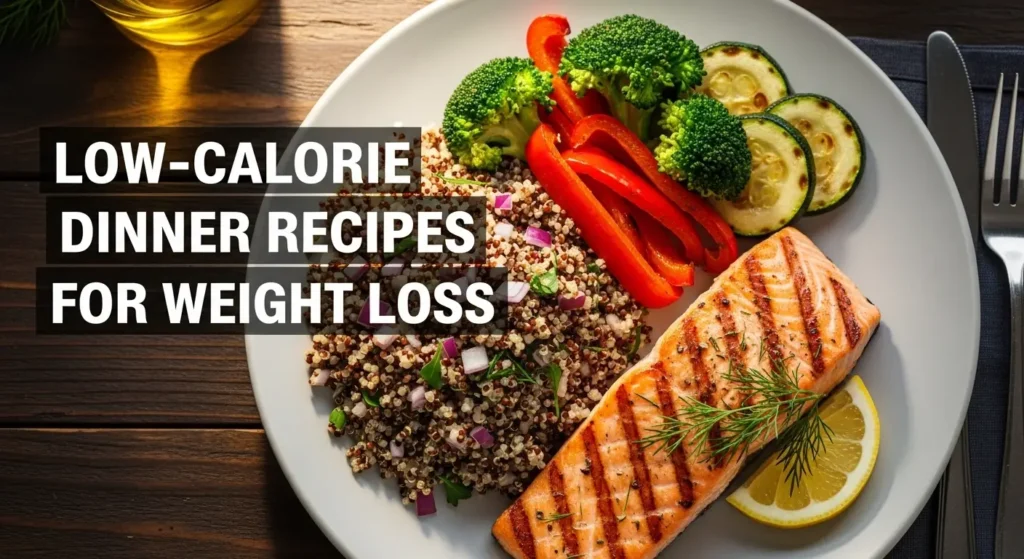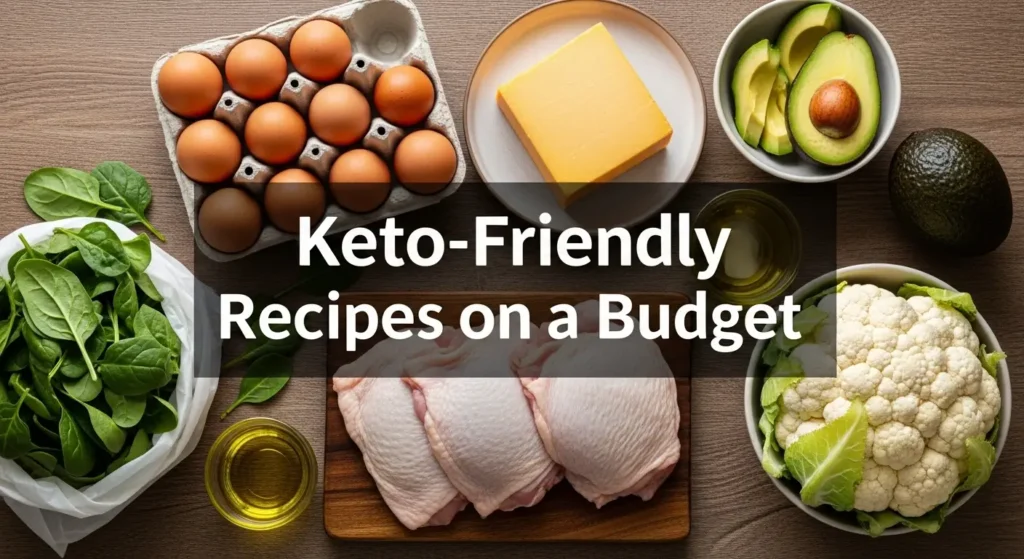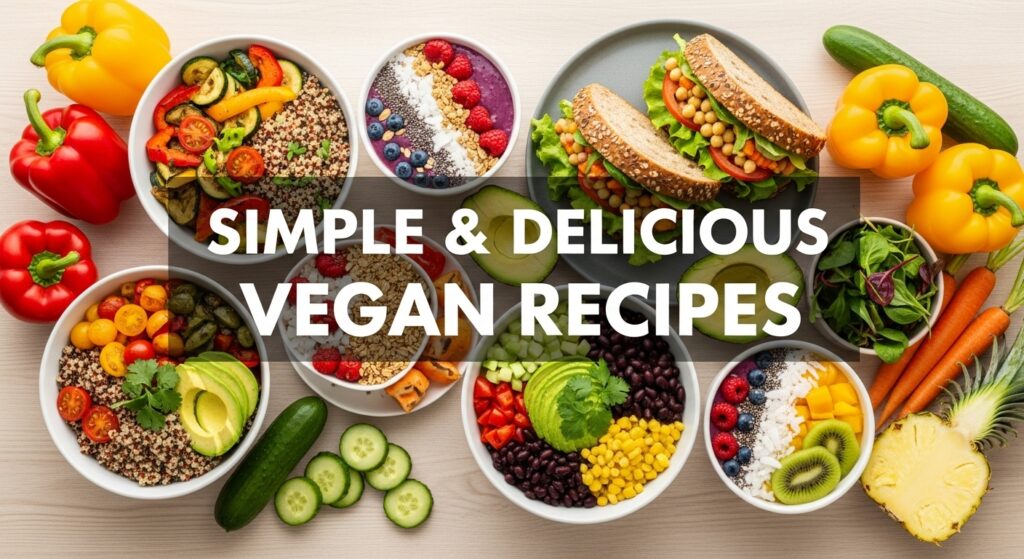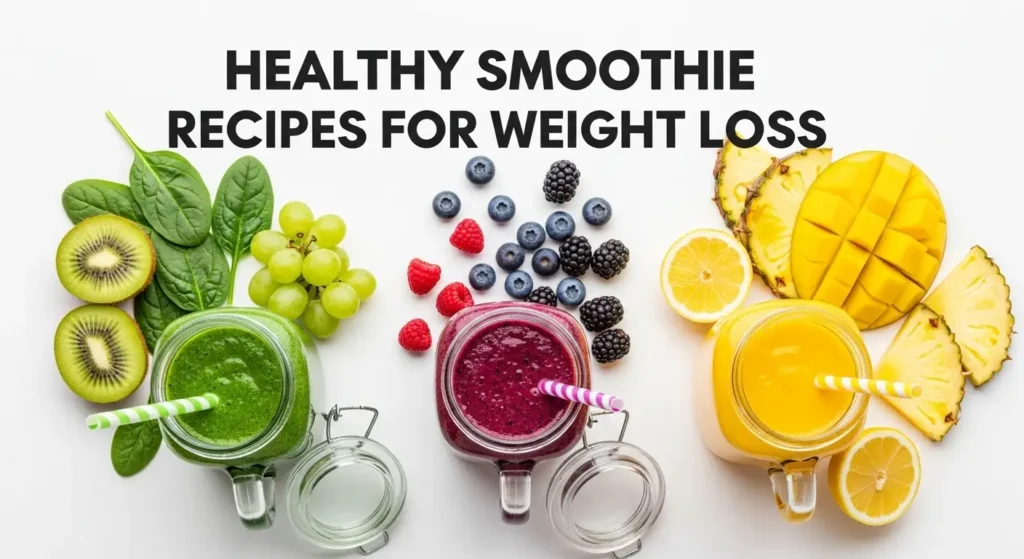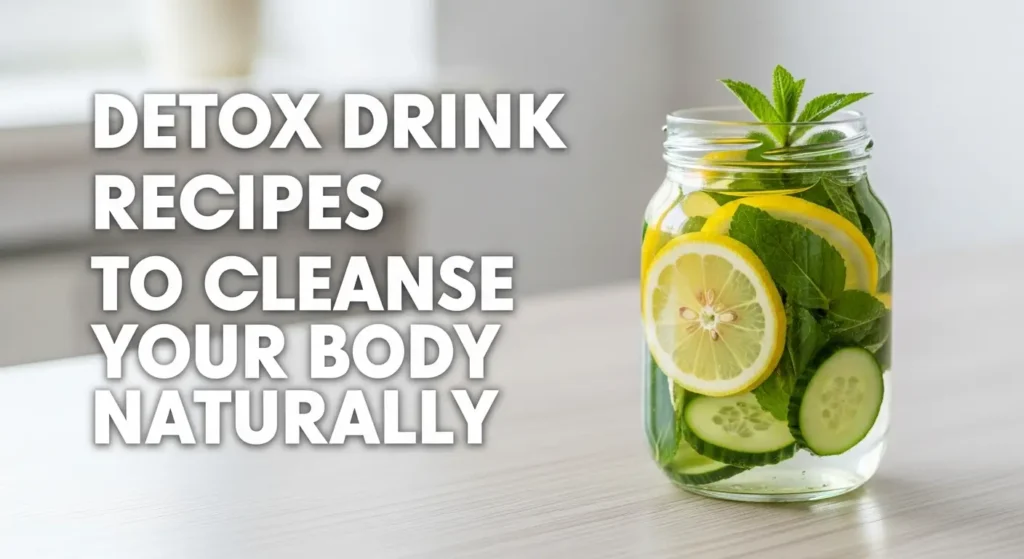Looking to build muscle and stay energized throughout the day? Then high-protein recipes for muscle gain and energy should be at the top of your fitness routine. Protein is the building block of muscles, and when paired with the right carbs and healthy fats, it fuels workouts, speeds recovery, and keeps you full longer.
Whether you’re an athlete, a gym enthusiast, or someone simply aiming for a healthier diet, protein-packed meals are your best friend. In this article, we’ll explore delicious high-protein recipes, tips for balancing macros, and meal ideas you can prepare at home without hassle.
Why Protein is Essential for Muscle Gain and Energy
Protein does more than just build muscle—it also supports metabolism, repairs tissues, and boosts energy levels. Here’s why it’s a must-have:
- Muscle repair and growth – after workouts, protein helps rebuild torn muscle fibers.
- Satiety booster – protein keeps you full longer than carbs or fats.
- Energy provider – steady protein intake prevents fatigue and improves stamina.
- Supports weight management – it increases thermogenesis, meaning your body burns more calories while digesting it.
How Much Protein Do You Need Daily?
The recommended amount varies depending on activity level:
| Activity Level | Protein per kg of Body Weight | Example for 70kg Person |
|---|---|---|
| Sedentary | 0.8 g | ~56 g |
| Active | 1.2–1.6 g | ~84–112 g |
| Muscle Gain | 1.6–2.2 g | ~112–154 g |
If your goal is muscle gain and sustained energy, aim for 1.6–2.2 grams per kg of body weight.
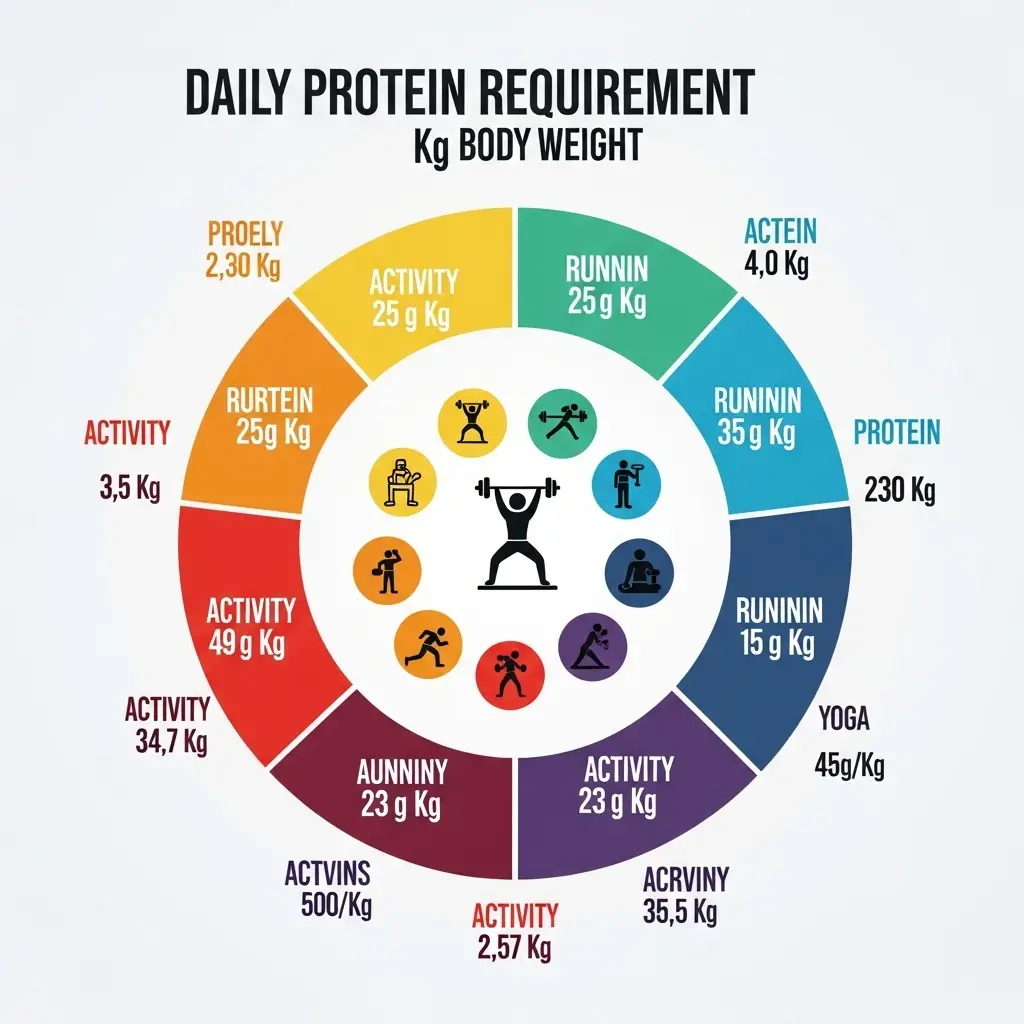
High-Protein Breakfast Recipes
They say breakfast is the most important meal of the day, and that’s especially true if you’re chasing fitness goals. Let’s look at energizing options:
1. Protein-Packed Omelet
- Ingredients: 3 egg whites + 1 whole egg, spinach, bell peppers, mushrooms, feta cheese.
- Protein content: ~25g per serving.
- Tip: Add chicken or turkey breast for an extra boost.
2. Overnight Oats with Protein Powder
- Ingredients: Rolled oats, almond milk, 1 scoop vanilla protein powder, chia seeds, and berries.
- Protein content: ~30g per jar.
- Why it works: Provides slow-digesting carbs and high protein for all-day energy.
3. Greek Yogurt Parfait
Layer Greek yogurt with granola, nuts, and honey for a quick 20g protein meal.
Also Read: Gluten-Free Almond Flour Banana Bread Without Sugar
High-Protein Lunch Recipes
Your midday meal should be balanced enough to keep you productive without feeling sluggish.
1. Grilled Chicken Quinoa Bowl
- Ingredients: Grilled chicken breast, quinoa, broccoli, and olive oil.
- Protein content: ~40g per serving.
- Why it’s great: Lean protein + complex carbs = perfect muscle-fuel combo.
2. Tuna Salad Wrap
- Ingredients: Canned tuna, Greek yogurt, celery, whole wheat wrap.
- Protein content: ~35g.
- Tip: Swap mayo with Greek yogurt for fewer calories and more protein.
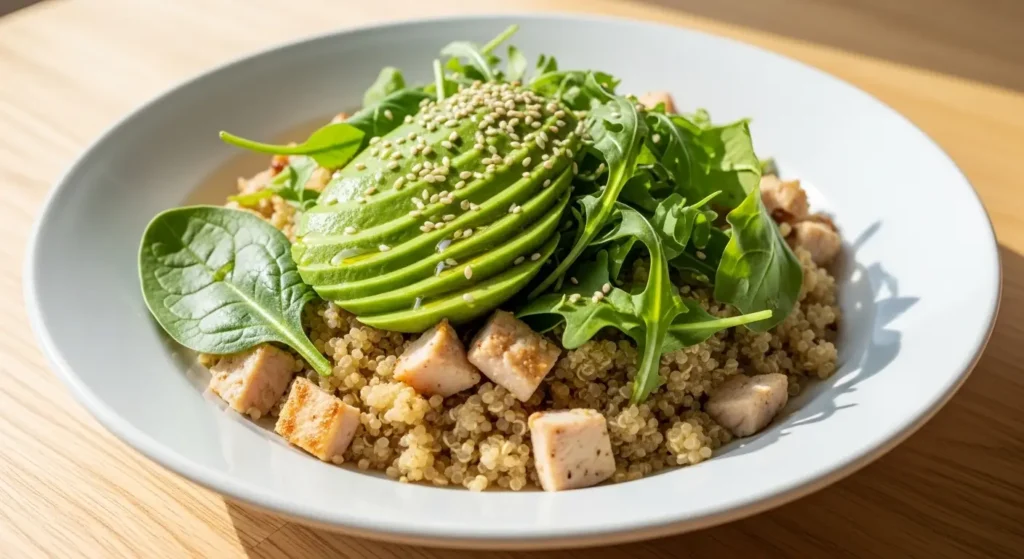
High-Protein Dinner Recipes
Dinner is when your body prepares for recovery and growth while you sleep.
1. Salmon with Steamed Veggies
- Protein content: ~45g per serving.
- Benefits: Omega-3 fatty acids improve muscle recovery and heart health.
2. Turkey Chili
- Ingredients: Ground turkey, beans, tomatoes, onions, spices.
- Protein content: ~35g per bowl.
- Why it works: A hearty comfort food that’s also muscle-friendly.
3. Lean Beef Stir-Fry
- Protein content: ~40g.
- Tip: Use colorful veggies like bell peppers, carrots, and snap peas for added nutrients.
High-Protein Snacks for Muscle Gain
Snacking smart helps you hit your daily protein goals without overeating.
- Hard-Boiled Eggs – 6g protein each.
- Cottage Cheese with Pineapple – 14g protein per cup.
- Protein Smoothie – blend whey protein, banana, and almond butter (~30g protein).
- Roasted Chickpeas – a crunchy plant-based option with 15g protein per cup.
Vegetarian and Vegan High-Protein Options
Protein isn’t just for meat lovers—plant-based foods can pack a punch too.
Best Plant-Based Protein Sources:
- Lentils (18g per cup cooked)
- Tofu (20g per block)
- Edamame (17g per cup)
- Seitan (25g per 3.5 oz)
- Chickpeas (15g per cup cooked)
Vegan Protein Recipe Idea – Chickpea Buddha Bowl
- Ingredients: Roasted chickpeas, quinoa, kale, tahini dressing.
- Protein content: ~25g.
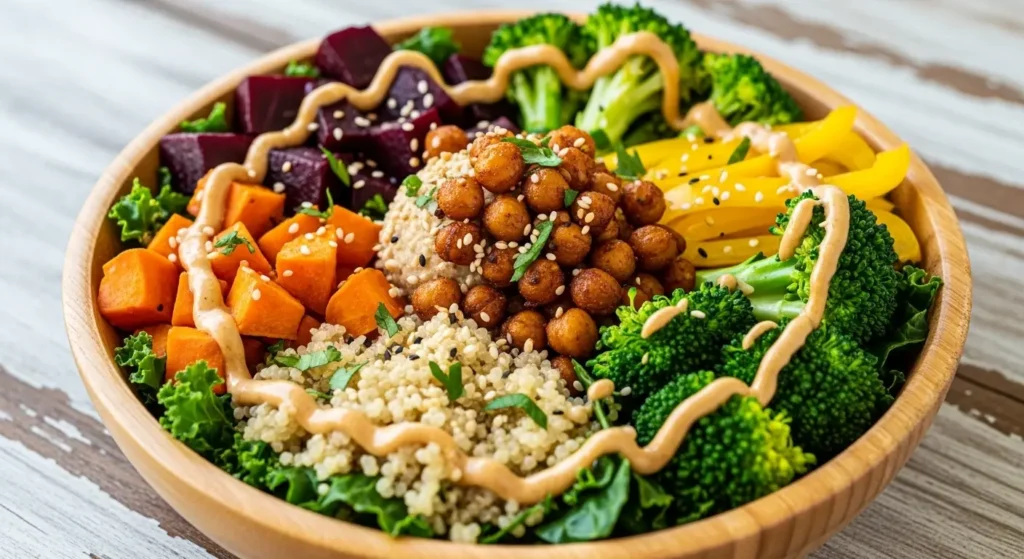
Tips to Maximize Protein Absorption
Getting enough protein is one thing, but maximizing absorption ensures your body uses it effectively:
- Spread protein throughout the day – avoid eating it all in one meal.
- Pair protein with fiber and healthy fats – improves digestion.
- Stay hydrated – water helps metabolize protein efficiently.
- Choose lean sources – avoids unnecessary fat and calories.
- Post-workout timing – consume 20–30g protein within 30–60 minutes after exercise.
Key Takeaways
- Protein is crucial for muscle growth, energy, and overall health.
- Aim for 1.6–2.2g/kg body weight if building muscle.
- Mix up your meals with eggs, chicken, fish, beans, tofu, and protein powder.
- Don’t forget snacks and plant-based options to hit your daily protein goals.
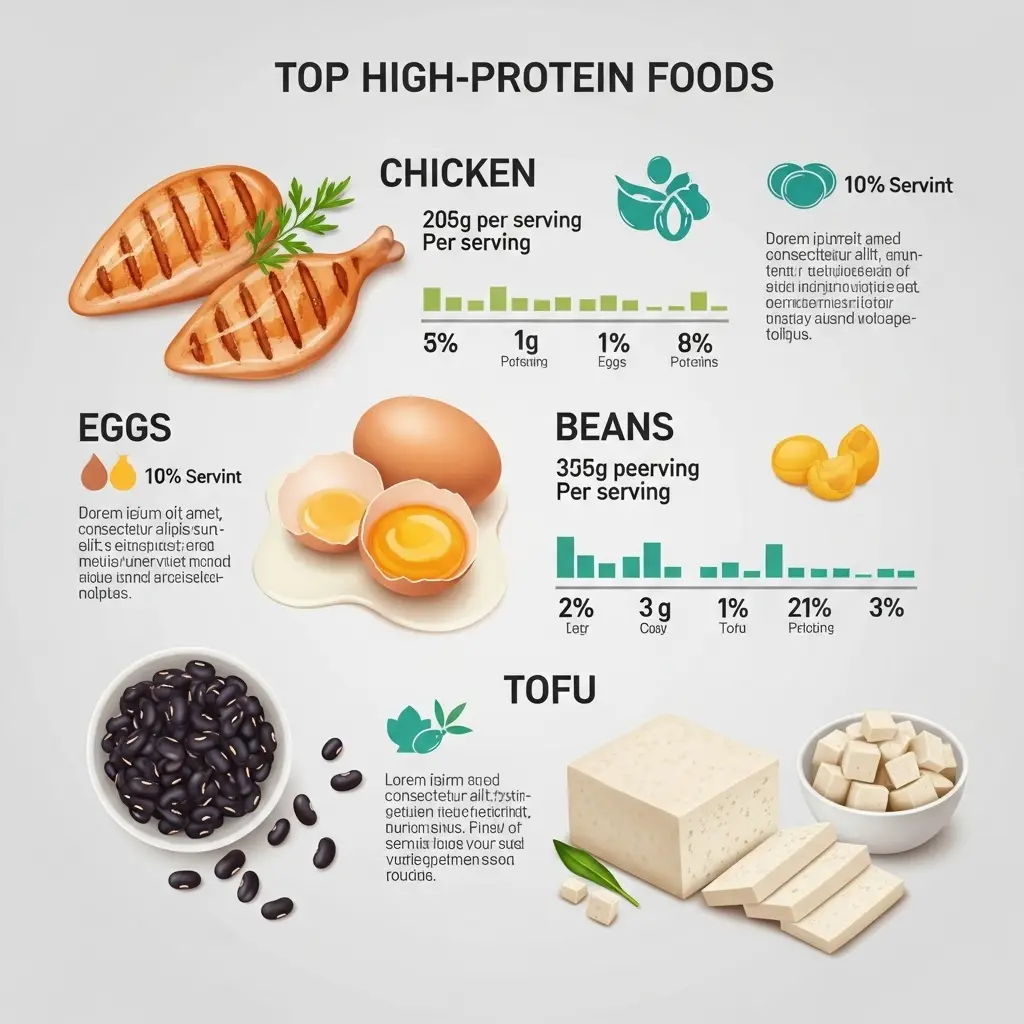
Frequently Asked Questions (FAQs)
1. What are the best high-protein recipes for muscle gain?
Meals like grilled chicken quinoa bowls, turkey chili, salmon with veggies, and protein-packed omelets are excellent for building muscle.
2. Can vegetarians gain muscle with plant protein?
Yes! Foods like tofu, seitan, lentils, and edamame provide enough protein for muscle gain when eaten in proper amounts.
Also Read: Vegan Sweet Potato and Black Bean Chili for Dinner
3. How much protein should I eat per meal?
Aim for 20–40 grams of protein per meal depending on your body weight and activity level.
4. Is protein powder necessary for muscle gain?
Not always. Whole foods can meet protein needs, but powders are convenient for busy schedules or post-workout nutrition.
5. What’s the best time to eat protein for energy?
Spread protein intake evenly across meals and snacks, and prioritize post-workout protein to support muscle recovery.
Conclusion
Fueling your body with the right foods makes all the difference in fitness. These high-protein recipes for muscle gain and energy provide the perfect balance of nutrients to keep you strong, energized, and satisfied. Whether you prefer chicken, salmon, or plant-based sources, the key is consistency and variety.
Start experimenting with these recipes today, and watch how your body rewards you with strength, endurance, and vitality.

